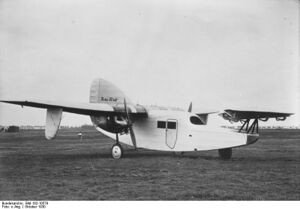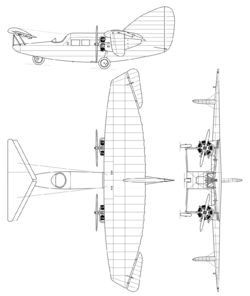Engineering:Focke-Wulf F 19
| F 19 Ente | |
|---|---|

| |
| Role | Civil utility aircraft |
| Manufacturer | Focke-Wulf |
| First flight | 2 September 1927 |
| Number built | 2 |
| Developed into | Focke-Wulf Fw 42 |
The Focke-Wulf F 19 Ente (German: "Duck") was a German experimental "canard" aircraft in the late 1920s.
Design
The F 19 Ente was a high-wing monoplane with a canard layout and fixed tricycle undercarriage. The pilot sat in an open cockpit, while an enclosed cabin was provided for two or three passengers. The canard was mounted on short struts above the nose of the aircraft, ahead of the cockpit, and the two engines were housed in nacelles mounted under the wings.
The F 19 design was set so that the front stabilizer would stall some moments before the rear-mounted main wing, which in theory made the Ente virtually stall-proof.[1]
Operational history
The first example flew on 2 September 1927 but was destroyed on 29 September during a demonstration of single-engine flight, after a control rod snapped. Focke-Wulf co-founder Georg Wulf was killed in the crash. Nevertheless, a second aircraft (D-1960) was built, flying in late 1930.[2] This was used for a promotional tour of Europe the following year which took it to Denmark, Sweden, the Netherlands, Belgium, and the UK. On 7 November 1931, it was demonstrated at Hanworth Air Park, flown by Focke-Wulf chief pilot Cornelius Edzard.[3][4]
Later, it was put on display at the Deutsche Luftfahrtsammlung in Berlin, where it was destroyed in an Allied air raid in 1944.
Specifications

General characteristics
- Crew: one pilot
- Capacity: three passengers
- Length: 10.53 m (34 ft 7 in)
- Wingspan: 10.00 m (32 ft 9 in)
- Height: 4.15 m (13 ft 7 in)
- Wing area: 29.5 m2 (318 ft2)
- Empty weight: 1,175 kg (2,590 lb)
- Gross weight: 1,650 kg (3,638 lb)
- Powerplant: 2 × Siemens Sh 14, 82 kW (110 hp) each
Performance
- Maximum speed: 142 km/h (88 mph)
- Service ceiling: 3,000 m (9,840 ft)
Armament
Notes
- ↑ "Airplanes of The World" page 169, published 1962 Simon and Schuster, LCCN 54-8640
- ↑ Heinze, Edwin P, The Focke-Wulf Ente, Flight 2 January 1931 pp. 4-7 flightglobal.com
- ↑ Flight 13 November 1931 flightglobal.com
- ↑ The Tail First Plane britishpathe.com (Note: Commentary by passenger The Hon Mrs Victor Bruce, pilot Edzard in cockpit)
References
- Taylor, Michael J. H. (1989). Jane's Encyclopedia of Aviation. London: Studio Editions. pp. 395.
- World Aircraft Information Files. London: Bright Star Publishing. pp. File 894 Sheet 29.
External links
- "Plane That Flies Backwards Called Safest Craft", February 1931 rare photo in article
- 1931 British Movietone newsreel film of Focke Wulf F 19 Ente taking off, flying, and landing
- The Tail First Plane (1931), British Pathé
- Photos and film of Focke Wulf F 19 Ente
